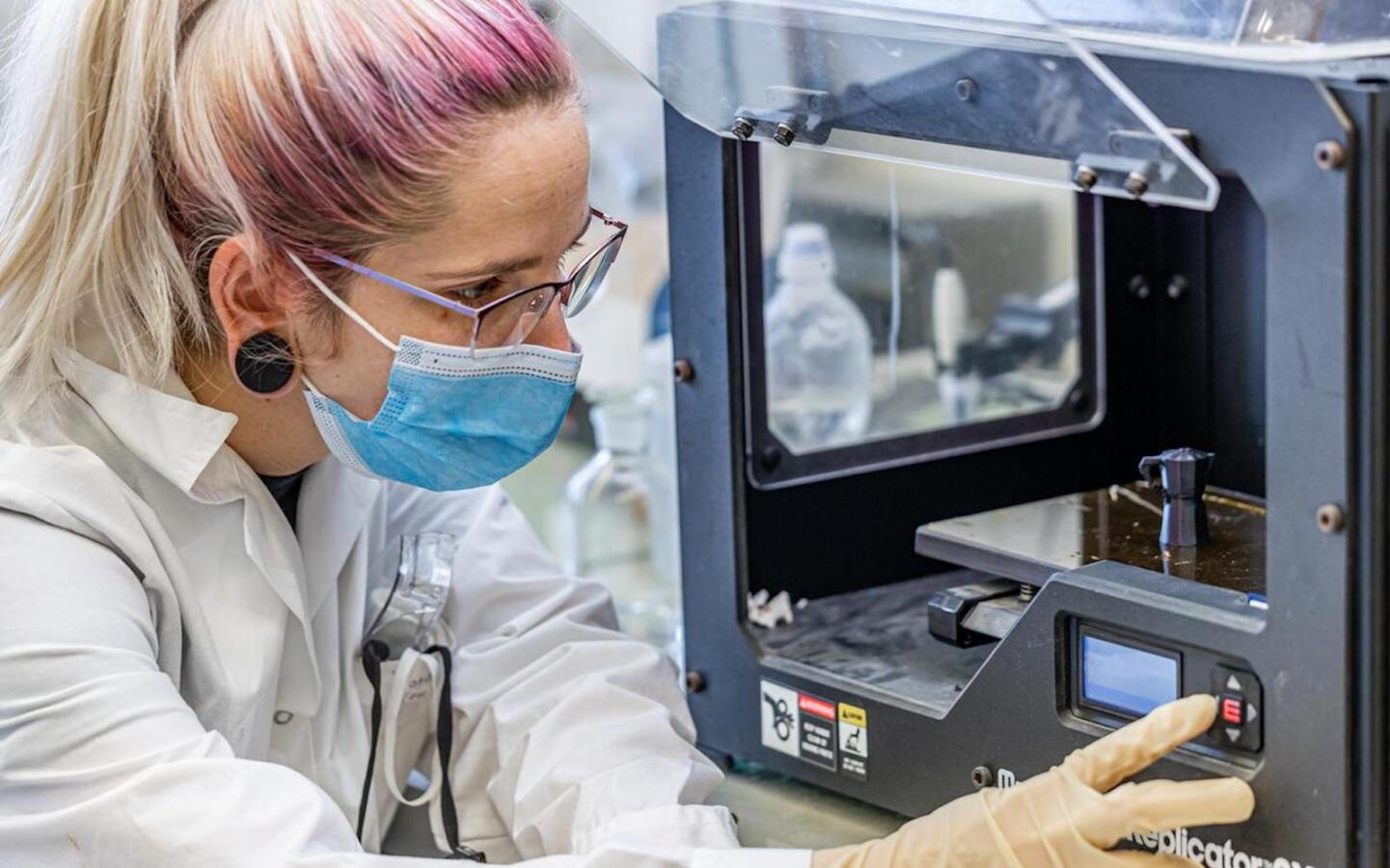On his daily commute to Jerusalem, Uriah Bekenstein liked to listen to podcasts from Y Combinator, a well-known American technology startup accelerator famous for launching thousands of companies, like Airbnb and DoorDash.
A trained molecular neurobiologist, Bekenstein wondered if his own research on the delivery of therapeutic drugs to the brain might have viable business potential.
Aware of the importance of thinking not just as a scientist but also as an entrepreneur, Bekenstein joined OPEN, a start-up accelerator program at ASPER-HUJI Innovate, the Innovation and Entrepreneurship Center of the Hebrew University of Jerusalem (HU).
“It doesn’t matter what you study, every discipline has the need for you to be entrepreneurial and develop an entrepreneurial mindset,” said Amnon Dekel, executive director of the center. Over the course of several months, Bekenstein, who has a Ph.D. from the Hebrew University, received help from the center on improving his market research, ideation, business planning and product development. In addition, the program offered hands-on workshops, support from experienced mentors, industry connections and a shared workspace. It culminated with a Demo Day event where Bekenstein and fellow OPEN program participants pitched their business startups to investors and other entrepreneurs.

Help us keep Jewish knowledge accessible to millions of people around the world.
Your donation to My Jewish Learning fuels endless journeys of Jewish discovery. With your help, My Jewish Learning can continue to provide nonstop opportunities for learning, connection and growth.
“Within months of starting the program, my research team and I got what we considered the best guidance, resources and experience from experts who helped us grow what was a concept into a venture, which is now our company, NucleoTech,” Bekenstein said. “The support was critical to kick us off and I was very appreciative.”
The OPEN program is just one of the many ways ASPER-HUJI Innovate leverages innovation potential among students, alumni, and staff of the Hebrew University to address global problems through entrepreneurship. The center offers classes — including its signature course, “Introduction to Innovation and Entrepreneurship,” available to every Hebrew University undergraduate — and hosts events, hackathons and competitions during the year.
“Through all of the activities that we offer at the university, the hope and vision for our students is that we teach them a way of thinking so that they can create new knowledge in this world and leverage this knowledge as entrepreneurs,” Dekel said.
Every year as the academic year winds down, dozens of startups all affiliated with the Hebrew University compete for the highly coveted ASPER Prize for Emerging Startups. In June 2023, after narrowing the field to five finalists, the year’s 100,000 Shekel prize (about $27,000) went to Avertto, a healthcare startup that developed a system to monitor blood flow to the brain. The system detects any changes and provides real-time alerts to enable timely treatment for preventing strokes.
“I am proud of the Hebrew University and its ability to harness scientific knowledge to create technology to make the world a better place,” Prof. Asher Cohen, president of the Hebrew University, said after the competition. “I have no doubt that the knowledge and tools our students acquire at the university and the interdisciplinary ecosystem gives them the means for becoming the next generation’s technology entrepreneurs, who will be at the forefront of human development.”
The Hebrew University has long been a driver of innovation, entrepreneurship and change-making research. Companies like the lab-grown meat company Believer Meats and Mobileye, which produces driver assist and autonomous driving technologies and was bought by Intel in 2017 before going public again in 2022, have their origins at the Hebrew University.
“Curiosity is important when trying to solve problems,” said Yishai Fraenkel, vice president and director general of the Hebrew University. “Our researchers are very attentive to the outside world and seek solutions to problems. They walk outside their silos and go beyond their disciplines to seek partnerships.”
In 1964, the Yissum Research Development Company was created to help bring to market technological innovations developed at the Hebrew University. As the tech transfer hub for the university, Yissum has racked up an impressive roster that includes tens of thousands of patents, inventions, portfolio companies and licensing deals.
In October 2022, Yissum and the Hebrew University’s Rachel and Selim Benin School of Computer Science and Engineering announced a new research partnership with Meta AI. It’s the first partnership of its kind between an Israeli university and the Silicon Valley behemoth that owns Facebook, Instagram and WhatsApp. The research partnership was designed to allow doctoral students at the Hebrew University the opportunity to be assigned mentors at Meta, have access to the company’s computational infrastructure and facilities, gain real-world work experience, develop new technologies, and apply for scholarships to better understand emerging technologies like artificial intelligence and machine learning.
“Meta’s choice to collaborate with the Hebrew University is proof of our institution’s scientific excellence and the commercial success that Yissum has achieved for its leading professors,” said Itzik Goldwaser, Yissum’s CEO. “The university’s curious and innovative researchers play a critical role in the marketplace, and we are proud to facilitate this collaboration with Meta to impact the scientific community.”
Yissum also works with the Robert H. Smith Faculty of Agriculture, Food and Environment at Hebrew University, the only faculty of agriculture at any Israeli university. In October 2022, the Smith Faculty of Agriculture hosted the inaugural FoodTech Conference in Jerusalem, a one-day event that brought together food industry startups, researchers, practitioners, students and investors. A variety of speakers and panels focused on such topics as food security, alternative proteins and AI-based agriculture.
The conference also showcased several of the university’s most promising food industry startups, including Kinoko Tech, winner of the 2022 ASPER Prize for Emerging Startups.
“Startups have become the growth engine of the food industry,” said Ilya Pittel, vice president of business development for Yissum. “There is a lot of know-how in Israel in food technology, and the talent and innovation displayed at Hebrew University’s conference is proof.”
For close to 25 years, startup companies have been the key growth engines across a variety of disciplines and industries in Israel and around the world.
The Hebrew University Business School designed its International StartUp 360° MBA program to give a select group of students the knowledge and skills required to successfully adapt to this new business reality.
Classes on business fundamentals are taught in English by industry experts during the immersive, 11-month program. In addition, students participate in an internship project with venture capitalists or startup companies with proven success in entrepreneurship and innovation. And what of the Hebrew University’s entrepreneurial success?
“Think big, invent big,” Fraenkel said of the university’s legacy. “It’s endless curiosity and creativity, side-by-side with boundless humanism and very good science.”
This article was sponsored by and produced in collaboration with American Friends of the Hebrew University, a national nonprofit that connects the passions of Americans to talent at the Hebrew University of Jerusalem. This story was produced by My Jewish Learning’s native content team.



